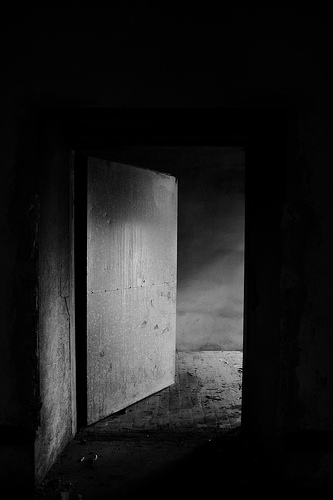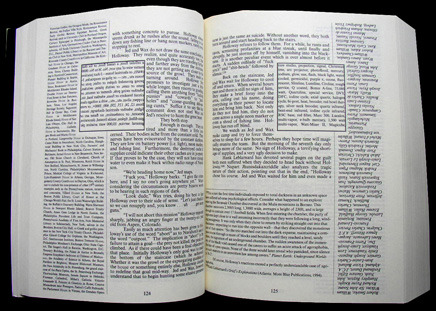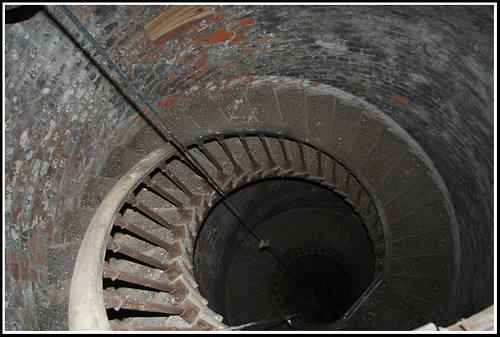I'm breaking this review up into two parts for a couple reasons:
1.) This is one of the thickest books I've ever read.
2.) This is one of the most dense, most frightening, most complex books I've ever read.
I'm something of a nerd when it comes to the paranormal. I think there's something fascinating with confronting those things we don't understand, that we can't understand. We, the living, are death-focused. We ponder the existence of life after death and the possibility of death trying to remain in the world of the living. It's provocative and it's interesting; the unexplainable will forever be at the forefront of our collective imaginations.
I saw a show awhile back about the haunting of an old southern prison that people used to call "The Sugarhouse." It was called such because it's where the slaves and prisoners were taken "to be sweetened up" in order to give information to their jailors. Many of these prisoners died from various forms of torture and thus, their spirits are said to still haunt the grounds.
This got me thinking about writing my own horror story, something I had never thought about before as the stories I'd always wanted to tell were on the far other side of the spectrum of reality. But then another show called "American Horror Story" (my review here) showed up on the FX channel and really convinced me that I should give it a try. From my bookshelf, I started looking at various books that explored the world of horror and decided upon Danieleski's "House of Leaves," which has turned out to be a great jump-off point for my next writing endeavor.
Sitting at a lofty 709 pages, the text and formatting make it closer to a 1400 page book. We start off in the perspective of our first narrator (there are multiple), a tattoo artist named Johnny Truant. His friend Lude shows him the apartment of a man who died. In this apartment they find pages upon pages of the former occupant's writing which is essentially what the actual book is; it is the documentation, in a scholarly style (a thesis or doctoral research paper) of a collection of footage called "The Navidson Record." In this apartment, they also find several locks on the door, fingernail scratchings in the floor, and all the windows shut lock-tight with no way of being opened. The former occupant, a man named Zampano, has compiled these pages and notated them with quotes from books that don't exist or cannot be found.
From this point on, we're essentially reading "The Navidson Record" at the same time as Truant. "The Navidson Record" turns out to be the video footage, spliced and edited post-trauma, of a family moving into a house. One day, a door appears in their hallway that wasn't there before and, upon an initial inspection by the father (simply called Navy in most instances), the hallway extends for miles...out through where their backyard should be. It is an impossible situation that logic cannot deconstruct. The halls should not exist since the backyard is still there, but they do. The door should not exist, but it does.
While we get the very academic deconstruction of the video footage (through quotes from books about the incident and scientific explanations of echoes and mythology in regards to labyrinths), we also get to see the slow fracturing of not only the Navidson family, but of our main narrator, Truant, as well. Truant's prose becomes more grandiose and lofty as each page passes. The more he reads of the document, the more he feels like he's "losing it," at one point even imagining that he leaves his apartment only to be hit by a truck, flung on to the top of his car, which is then run into by the same truck, which then spills gas and the possibility of an explosion. In fact, this moment is pure hallucination on his part. These moments come more and more often the deeper we delve into the text.
When Navidson realizes that he has a serious issue with his house, he calls not only his brother (with whom he had a rocky relationship), but also later calls in a team of outdoorsmen who are well-versed in traversing new and unexplored areas - people who have experience in intentionally getting lost. This is where the book starts getting wonky.
At first, I didn't much care for the strange formatting; footnotes ended up sideways on the upper parts of pages, bits of text were turned backwards in their own little boxes in the middle of the page (see above photo) and often contained a litany of names and places that seemed to have no real bearing on either of the two storylines running at that point. But I realized soon that, while the explorers were getting lost in this new cavernous and unexplainable hallway (for 8 DAYS!!!), the text itself was mimicking the kind of shape-changing effect that the hallway had for those involved. Nothing was static, everything was up for grabs. Stability of anything could not be counted on. Everything about these passages was psychological terror and it worked.
There are a few appendices in the back that are referred to in this first section, one of which are the letters Truant's mother sends him from a mental home while he's bouncing around from foster home to foster home. I absolutely cannot ruin my favorite letter, one that I spent an hour decoding by making words and sentences from the first letter of each word in the nonsensical text, but suffice it to say that it wasn't the first time Danielewski uses the text in an incredibly effective way to bring about more terror on the part of the reader in an effort to empathize with the characters. The process of the decoding was slow, agonizing, drawn out, and absolutely powerful. I felt my chest constrict as I realized what the hidden message said.
I have stopped at page 245 to write this because the more I read, the more engrossed I become. The explorers are lost in the cavernous hallway, which has itself produced a downward-spiraling staircase into an unimaginable black depth and more hallways and rooms for them to explore. Navidson and his brother and their friend have gone in after the explorers, knowing that something terrible has happened to one or all of them. I know that if I don't stop now, I will have finished this book by nightfall and I almost want to relish the delicious terror that is building up at a grueling pace.
Despite some very tangential movements in the storyline, both in the academic deconstruction and Truant's interludes and commentary, I'm thoroughly engrossed in this book. It's taken some serious patience to get through some of the initial chapters, but it's absolutely paying off right now. I have zero idea as to how this will end and there are very few clues leading me on. The book is a puzzle to be solved. So much so, in fact, that there is a web forum devoted to picking apart each little clue that Danielewski leaves scattered throughout the book. Like a vision of something truly terrible and unimaginable, I can't take my eyes off it for fear of losing it altogether...
(3,298)





No comments:
Post a Comment